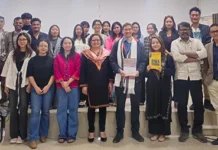Flights Of Fantasy
[ M Panging Pao ]
India and China have had an acrimonious relationship over the last 60 years. The major conflict was the Sino-India war of 1962, when the Chinese forces entered almost 100 kms inside Indian territory.
There have been frequent clashes, including at Nathu La, in Sikkim, in 1967, which led to more than 150 Indians and 340 Chinese killed; in 1987 at Sumdorong Chu in Arunachal; the 73-day confrontation over Doklam in 2017; and Chinese incursions into Asaphila, Tuting and Chaklagam areas of Arunachal in 2017-2018.
Recently, the Sino-India conflict flared up in the last few months, starting with the clash at Pangong Tso lake in Ladakh on 5 May, in which many soldiers on both sides were seriously injured, followed by the skirmish in North Sikkim on 20 May. The skirmishes finally led to the violent clashes in Galwan Valley during the night of 15/16 June. Since there was a protocol of not carrying weapons, the violent clashes witnessed soldiers attacking each other with swords, iron rods, stones and sticks studded with nails.
The violent clashes left 20 Indians soldiers killed, including the commanding officer. In fierce reprisal attacks by Indian soldiers, 40 plus Chinese soldiers were also killed. It is reported that many soldiers from both sides crashed into the Galwan river in the deep ravine. Post the clashes, immediate steps were taken for de-escalation, which led to the release of 10 Indian soldiers on 19 June.
India as a nation was triggered into action by the Chinese aggression. There is a massive movement to boycott Chinese products and applications. Presently, Chinese products dominate many major sectors. In smartphones, Chinese products like Xiaomi, Vivo, Realme and Oppo dominate 72 percent of the Indian market. Chinese coverage is about 25 percent in the telecom sector, 45 percent of the smart TV market, 60 percent in the pharma sector, and 90 percent in solar power sector.
Chinese applications like Tik Tok, Zoom, Xender, CamScanner and PUBG dominate 60 percent of the app market in India. Major companies in India like Paytm, Flipkart, BYJU’s, Ola, Oyo, Snapdeal and Zomato have major Chinese investments.
China is a major world power with the largest army and the second largest economy in the world; we must avoid escalating the tense situation and keep diplomatic channels open to avoid a major conflict. Both India and China are affected by the Covid-19 pandemic, with millions losing jobs and economies in recession. Although as a nation we have to defend our areas till the last bullet and the last man, a major Sino-India conflict would be disastrous for both the nations. We in Arunachal and Assam are directly affected, since the battleground would be here. All citizens should start boycotting Chinese products and applications to whatever extent possible to affect China economically. We should also rally world opinion against Chinese aggression. War happens when diplomacy fails. We should follow the teachings of our own Chanakya and practice some Chanakya niti to avoid a war. (The contributor is retired Group Captain, Indian Air Force)





